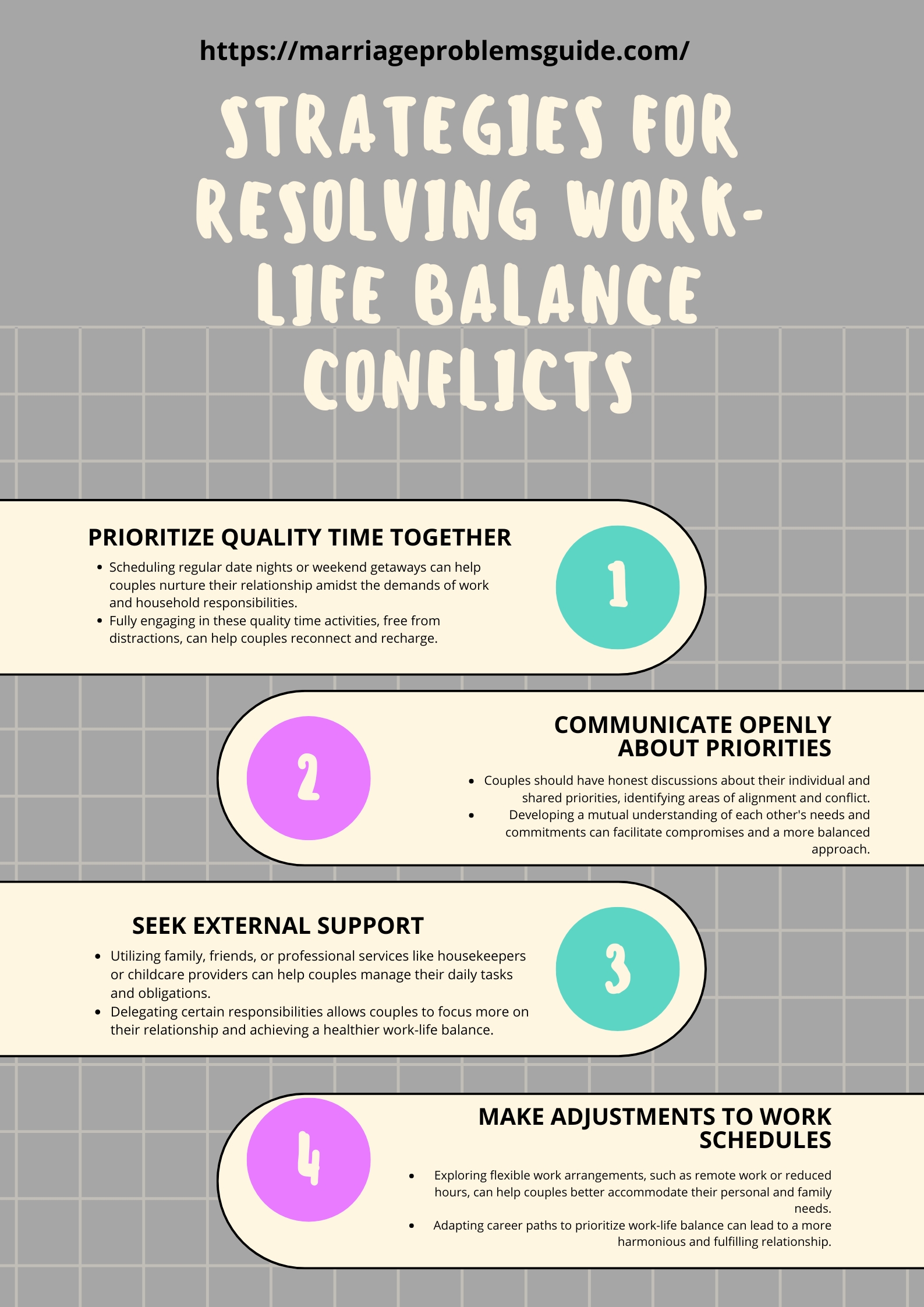Marriage is a complex and rewarding relationship, but it is not without its challenges.
Conflict is a natural part of any marriage, and understanding the common sources of marital conflict can help couples navigate these challenges more effectively.
In this blog post, we will explore the top sources of marital conflict and provide strategies for resolving these issues.
Key Takeaways
- Marital conflict is a natural part of any relationship, and understanding the common sources can help couples navigate these challenges more effectively.
- Financial disagreements, such as budgeting, spending, and debt management, are a major source of conflict that can be resolved through open communication, joint financial planning, and seeking professional advice.
- Parenting disagreements, including disciplinary approaches and educational priorities, can be addressed by finding common ground, compromising, and involving children in decision-making.
- Differences in intimacy and emotional needs, both physical and emotional, can be navigated through open communication, empathy, and a willingness to meet each other’s needs.
- Work-life balance conflicts, stemming from career demands and household responsibilities, can be resolved by prioritizing quality time together, sharing responsibilities, and seeking support from family, friends, or professional services.
- Communication breakdowns, including poor listening and unproductive conflict resolution, can be improved through active listening, calm and non-judgmental communication, and constructive conflict resolution strategies.
- Infidelity and the resulting loss of trust can be devastating, but the relationship can be rebuilt through open communication, professional help, and a genuine commitment to rebuilding trust over time.
- Seeking professional support, such as couples therapy or counseling, can be invaluable in navigating the complex challenges of marital conflict.
Financial Disagreements
One of the most common sources of marital conflict is financial disagreements.
Finances are a significant part of a couple’s life together, and differing views on budgeting, spending, and debt can lead to significant tension.
Couples may have different financial goals, priorities, and risk tolerance levels, which can create a rift in their relationship.
1. Budgeting and Spending
Disagreements over budgeting and spending can be a major source of conflict. One partner may be more frugal, while the other may be more inclined to spend freely.
This can lead to arguments over where to allocate funds, how much to save, and how much to spend on discretionary items.
2. Debt Management
Debt can also be a significant source of conflict in a marriage. Couples may have different attitudes towards debt, with one partner being more comfortable with carrying debt and the other more averse to it.
Disagreements over the best way to manage debt, such as whether to prioritize paying it off or focus on other financial goals, can cause significant stress and strain on the relationship.
3. Strategies for Resolving Financial Conflicts
To resolve financial conflicts, couples should:
- Engage in open and honest communication about their financial goals, priorities, and concerns.
- Develop a joint budget that takes into account both partners’ needs and preferences.
- Establish clear financial roles and responsibilities, such as who is responsible for paying bills or managing investments.
- Seek professional financial advice or counseling if necessary to help navigate complex financial issues.
- Continually review and adjust their financial plan as their circumstances change.
Parenting Disagreements
Another common source of marital conflict is disagreements over parenting.
Raising children can be a significant challenge, and couples may have different views on how to approach various parenting issues, such as discipline, education, and extracurricular activities.
1. Disciplinary Approaches
Couples may have different perspectives on how to discipline their children, with one partner preferring a more authoritative approach and the other preferring a more permissive approach.
These differences can lead to conflicts over the best way to manage their children’s behavior.
2. Educational Priorities
Couples may also disagree on the importance of education and the best way to support their children’s academic development.
One partner may prioritize academic achievement, while the other may place more emphasis on extracurricular activities or social-emotional development.
3. Balancing Individual Needs
Parenting also requires balancing the individual needs and preferences of both partners, which can be challenging.
One partner may want to be more involved in their child’s life, while the other may have different priorities or commitments that limit their involvement.
4. Strategies for Resolving Parenting Conflicts
To resolve parenting conflicts, couples should:
- Engage in open and honest communication about their parenting values, goals, and concerns.
- Seek to find common ground and compromise on parenting approaches, rather than trying to impose their own views.
- Involve their children in age-appropriate decision-making to help them feel heard and respected.
- Seek the advice of parenting experts or counselors if necessary to help navigate complex parenting issues.
- Continually review and adjust their parenting approach as their children grow and their needs change.
Intimacy and Emotional Needs
Intimacy and emotional needs are another common source of marital conflict. Couples may have different levels of need for physical and emotional intimacy, which can lead to tension and resentment.
1. Physical Intimacy
Differing levels of physical intimacy can be a significant source of conflict in a marriage.
One partner may have a higher sex drive or different preferences for physical intimacy, which can lead to feelings of rejection or frustration for the other partner.
2. Emotional Intimacy
Emotional intimacy is also crucial for a healthy marriage, but couples may have different needs and expectations for emotional connection.
One partner may crave more emotional vulnerability and support, while the other may be less comfortable expressing their feelings or meeting their partner’s emotional needs.
3. Strategies for Resolving Intimacy Conflicts
To resolve intimacy conflicts, couples should:
- Engage in open and honest communication about their physical and emotional needs.
- Seek to find ways to meet each other’s needs, even if they are different.
- Explore new ways to connect and build intimacy, such as trying new activities or engaging in couples therapy.
- Prioritize quality time together, free from distractions, to nurture their emotional and physical connection.
- Seek professional help, such as a sex therapist or couples counselor, if they are unable to resolve their intimacy issues on their own.
Work-Life Balance
Another common source of marital conflict is the challenge of achieving a healthy work-life balance. Couples may struggle to find the right balance between their careers, household responsibilities, and their relationship.
1. Career Demands
One or both partners may have demanding careers that require significant time and energy, leaving little time for their marriage. This can lead to feelings of resentment and a lack of connection.
2. Household Responsibilities
In addition to career demands, couples may also struggle to balance the responsibilities of running a household, such as cleaning, cooking, and caring for children.
Unequal distribution of these tasks can create tension and conflict.
3. Strategies for Resolving Work-Life Balance Conflicts
To resolve work-life balance conflicts, couples should:
- Communicate openly about their priorities and the challenges they are facing in balancing work and home life.
- Develop a plan for sharing household responsibilities and childcare duties, and regularly review and adjust this plan as needed.
- Prioritize quality time together, such as regular date nights or weekend getaways, to nurture their relationship.
- Seek support from family, friends, or professional services, such as a housekeeper or childcare provider, to help manage the demands of daily life.
- Consider making adjustments to their work schedules or career paths to better accommodate their personal and family needs.
Communication Breakdowns
One of the most fundamental sources of marital conflict is breakdowns in communication.
Effective communication is crucial for a healthy marriage, and couples who struggle to communicate effectively may find themselves in a cycle of misunderstandings, resentment, and unresolved conflicts.
1. Listening and Understanding
Effective communication requires not just the ability to express one’s own needs and concerns but also the ability to actively listen and seek to understand the other partner’s perspective.
2. Conflict Resolution
Couples may also struggle with conflict resolution, either avoiding conflicts altogether or engaging in unproductive arguments that leave both partners feeling frustrated and unheard.
3. Strategies for Improving Communication
To improve communication and resolve conflicts more effectively, couples should:
- Practice active listening, seeking to truly understand each other’s perspectives and concerns.
- Communicate in a calm and non-judgmental manner, avoiding criticism, contempt, defensiveness, and stonewalling.
- Engage in constructive conflict resolution, focusing on finding solutions rather than placing blame.
- Seek the help of a couples therapist or communication coach if they are unable to improve their communication on their own.
Table: Common Sources of Marital Conflict and Strategies for Resolution
| Source of Conflict | Strategies for Resolution |
|---|---|
| Financial Disagreements | – Engage in open communication about financial goals and priorities
– Develop a joint budget – Establish clear financial roles and responsibilities – Seek professional financial advice if needed |
| Parenting Disagreements | – Communicate openly about parenting values and approaches
– Seek compromise and find common ground – Involve children in age-appropriate decision-making – Seek parenting advice or counseling if needed |
| Intimacy and Emotional Needs | – Communicate openly about physical and emotional needs
– Seek to meet each other’s needs, even if they are different – Explore new ways to connect and build intimacy – Prioritize quality time together – Seek professional help if needed |
| Work-Life Balance | – Communicate openly about priorities and challenges
– Develop a plan for sharing household responsibilities – Prioritize quality time together – Seek support from family, friends, or professional services Consider adjustments to work schedules or career paths |
| Communication Breakdowns | – Practice active listening and seek to understand each other’s perspectives
– Communicate in a calm and non-judgmental manner – Engage in constructive conflict resolution – Seek the help of a couples therapist or communication coach if needed |
| Infidelity and Trust Issues | – Engage in open and honest communication about the affair and its impact
– Seek professional help, such as couples therapy, to work through the challenges – Demonstrate a genuine commitment to rebuilding trust through consistent, trustworthy behavior – Consider implementing strategies, such as relationship contracts or transparency agreements, to help rebuild trust |
Infidelity and Trust Issues
Infidelity is a devastating breach of trust that can have a profound impact on a marriage.
The loss of trust that comes with infidelity can be incredibly difficult to repair, and it can take significant time and effort for a couple to rebuild their relationship.
1. Causes of Infidelity
Infidelity can be caused by a variety of factors, including emotional distance, unmet needs, opportunity, or a lack of commitment to the relationship.
Understanding the root causes of infidelity is crucial for addressing the issue and preventing it from happening again.
2. Rebuilding Trust
Rebuilding trust after an affair is a long and challenging process, but it is possible with the right strategies and a genuine commitment from both partners.
This may involve engaging in couples therapy, being completely transparent, and demonstrating a consistent pattern of trustworthy behavior over time.
3. Strategies for Addressing Infidelity
To address infidelity and rebuild trust, couples should:
- Engage in open and honest communication about the affair, its causes, and its impact on the relationship.
- Seek professional help, such as couples therapy, to work through the complex emotions and challenges associated with infidelity.
- Demonstrate a genuine commitment to the relationship and a willingness to rebuild trust through consistent, trustworthy behavior over time.
- Consider implementing strategies, such as relationship contracts or transparency agreements, to help rebuild trust and prevent future infidelity.
Conclusion
Marital conflict is a natural part of any relationship, but understanding the common sources of conflict and developing effective strategies for resolving them can help couples navigate these challenges more effectively.
By focusing on open communication, empathy, and a willingness to compromise, couples can build stronger, more resilient marriages that withstand the test of time.
If you are struggling with any of the issues discussed in this article, don’t hesitate to seek professional help, such as a couples therapist or counselor.
With the right support and strategies, you can overcome even the most challenging marital conflicts and create a lasting, fulfilling relationship.








